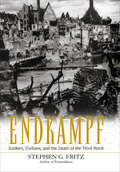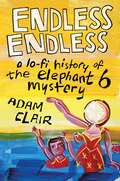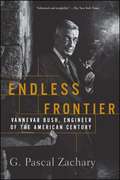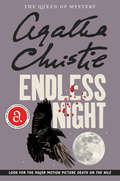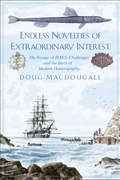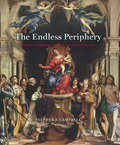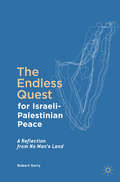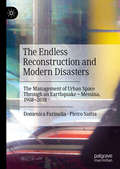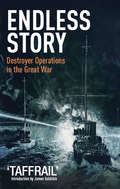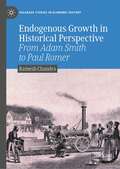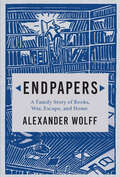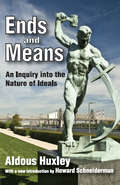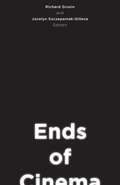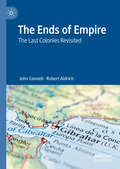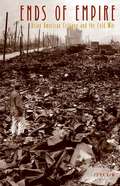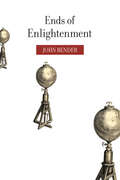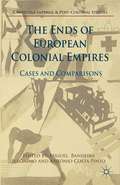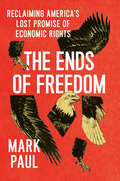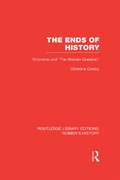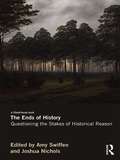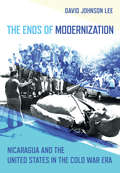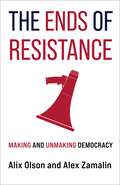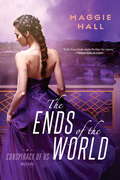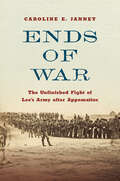- Table View
- List View
Endkampf: Soldiers, Civilians, and the Death of the Third Reich
by Stephen G. FritzAt the end of World War II, Gen. Dwight D. Eisenhower, fearing that retreating Germans would consolidate large numbers of troops in an Alpine stronghold and from there conduct a protracted guerilla war, turned U.S. forces toward the heart of Franconia, ordering them to cut off and destroy German units before they could reach the Alps. Opposing this advance was a conglomeration of German forces headed by SS-Gruppenführer Max Simon, a committed National Socialist who advocated merciless resistance. Under the direction of officers schooled in harsh combat in Russia, the Germans succeeded in bringing the American advance to a grinding halt. Caught in the middle were the people of Franconia. Historians have accorded little mention to this period of violence and terror, but it provides insight into the chaotic nature of life while the Nazi regime was crumbling. Neither German civilians nor foreign refugees acted simply as passive victims caught between two fronts. Throughout the region people pressured local authorities to end the senseless resistance and sought revenge for their tribulations in the "liberation" that followed. Stephen G. Fritz examines the predicament and outlook of American GI's, German soldiers and officials, and the civilian population caught in the arduous fighting during the waning days of World War II. Endkampf is a gripping portrait of the collapse of a society and how it affected those involved, whether they were soldiers or civilians, victors or vanquished, perpetrators or victims.
Endless Endless: A Lo-Fi History of the Elephant 6 Mystery
by Adam ClairAn inspiring, revelatory exploration of the genesis and impact of the fabled Elephant 6 collective and the baffling exodus of its larger-than-life luminary, Neutral Milk Hotel frontman Jeff Mangum Years after its release, Neutral Milk Hotel&’s In the Aeroplane Over the Sea remains one of the most beloved and best-selling albums in all of indie music, hailed as a classic so influential as to be almost synonymous with the ongoing vinyl revival. But despite its outsized impact, a question looms even larger: why did frontman Jeff Mangum, just as the record propelled him to the brink of music superstardom, choose instead to disappear entirely? The mystery has perplexed listeners for decades—until now. In barely two years, Neutral Milk Hotel rose from house show obscurity in Athens, Georgia, to widespread hype and critical acclaim, selling out rock clubs across the country and gracing the tops of numerous year-end best-of lists. But just as his band was reaching the escape velocity necessary to ascend from indie rock success to mainstream superstar, Mangum hit the eject button. After the 1998 release of Aeroplane and a worldwide tour to support it, Mangum stopped playing shows, releasing new music, or even doing interviews. He never explained why, not even to his friends or colleagues, but thanks to both the strength of Aeroplane and his vexing decision to walk away from rock stardom, Neutral Milk Hotel&’s impact only grew from there. In Endless Endless, Adam Clair finds the answer to indie rock&’s biggest mystery, which turns out to be much more complicated and fascinating than the myths or popular speculation would have you believe. To understand Mangum and Neutral Milk Hotel and Aeroplane requires a deep dive into the unconventional inner workings of the mercurial collective from which they emerged, the legendary Elephant 6 Recording Company. Endless Endless details the rise and fall of this radical music scene, the lives and relationships of the artists involved and the colossal influence that still radiates from it, centered around the collective&’s accidental figurehead, one of the most idolized and misunderstood artists in the world, presenting Mangum and his collaborators in vividly human detail and shining a light into the secret world of these extraordinary and aggressively bizarre artists. Endless Endless offers unprecedented access to this notoriously mysterious collective, featuring more than 100 new interviews and dozens of forgotten old ones, along with never-before-seen photos, answering questions that have persisted for decades while also provoking new ones. In this deeply researched account, Endless Endless examines not just how the Elephant 6 came to be so much more than the sum of its parts, but how community can foster art—and how art can build community.
Endless Frontier: Vannevar Bush, Engineer of the American Century
by G. Pascal ZacharyA prodigiously researched biography of Vannevar Bush, one of America’s most awe-inspiring polymaths and the secret force behind the biggest technological breakthroughs of the twentieth century.As the inventor and public entrepreneur who launched the Manhattan Project, helped to create the military-industrial complex, conceived a permanent system of government support for science and engineering, and anticipated both the personal computer and the Internet, Vannevar Bush is the twentieth century’s Ben Franklin. In this engaging look at one of America’s most awe-inspiring polymaths, writer G. Pascal Zachary brings to life an American original—a man of his time, ours, and beyond. Zachary details how Bush cofounded Raytheon and helped build one of the most powerful early computers in the world at MIT. During World War II, he served as Roosevelt’s adviser and chief contact on all matters of military technology, including the atomic bomb. He launched the Manhattan Project and oversaw a collection of 6,000 civilian scientists who designed scores of new weapons. After the war, his attention turned to the future. He wrote essays that anticipated the rise of the Internet and boldly equated national security with research strength, outlining a system of permanent federal funding for university research that endures to this day. However, Bush’s hopeful vision of science and technology was leavened by an understanding of the darker possibilities. While cheering after witnessing the Trinity atomic test, he warned against the perils of a nuclear arms race. He led a secret appeal to convince President Truman not to test the Hydrogen Bomb and campaigned against the Red Scare. Elegantly and expertly relayed by Zachary, Vannevar’s story is a grand tour of the digital leviathan we know as the modern American life.
Endless Night (The\agatha Christie Collection #Vol. 68)
by Agatha ChristieStrapped by a chauffeur's wages, Michael Rogers' want of a better life seems out of reach. Especially elusive is a magnificent piece of property in Kingston Bishop--unil a chance meeting with a beautiful heiress makes his dreams possible. Marrying her is the first step. Building the perfect home is the next. Unfortunately, Michael ignored the local warnings about the deadly curse buried in the tract of land, and living out his dreams may exact a higher price than he ever imagined. Praised as one of Agatha Christie's most unusual forays into gothic, psychological suspense, this novel of fate, chance, and the nature of evil was a personal favorite of the author's as well.
Endless Novelties of Extraordinary Interest: The Voyage of H.M.S. Challenger and the Birth of Modern Oceanography
by Doug MacdougallA gripping tale of exploration aboard H.M.S. Challenger, an expedition that laid the foundations for modern oceanography From late 1872 to 1876, H.M.S. Challenger explored the world’s oceans. Conducting deep sea soundings, dredging the ocean floor, recording temperatures, observing weather, and collecting biological samples, the expedition laid the foundations for modern oceanography. Following the ship’s naturalists and their discoveries, earth scientist Doug Macdougall engagingly tells a story of Victorian-era adventure and ties these early explorations to the growth of modern scientific fields. In this lively story of discovery, hardship, and humor, Macdougall examines the work of the expedition’s scientists, especially the naturalist Henry Moseley, who rigorously categorized the flora and fauna of the islands the ship visited, and the legacy of John Murray, considered the father of modern oceanography. Macdougall explores not just the expedition itself but also the iconic place that H.M.S. Challenger has achieved in the annals of ocean exploration and science.
The Endless Periphery: Toward a Geopolitics of Art in Lorenzo Lotto's Italy (Louise Smith Bross Lecture Series)
by Stephen J. CampbellWhile the masterpieces of the Italian Renaissance are usually associated with Italy’s historical seats of power, some of the era’s most characteristic works are to be found in places other than Florence, Rome, and Venice. They are the product of the diversity of regions and cultures that makes up the country. In Endless Periphery, Stephen J. Campbell examines a range of iconic works in order to unlock a rich series of local references in Renaissance art that include regional rulers, patron saints, and miracles, demonstrating, for example, that the works of Titian spoke to beholders differently in Naples, Brescia, or Milan than in his native Venice. More than a series of regional microhistories, Endless Periphery tracks the geographic mobility of Italian Renaissance art and artists, revealing a series of exchanges between artists and their patrons, as well as the power dynamics that fueled these exchanges. A counter history of one of the greatest epochs of art production, this richly illustrated book will bring new insight to our understanding of classic works of Italian art.
The Endless Quest for Israeli-Palestinian Peace
by Robert SerryIn this book a former United Nations Envoy offers an insider perspective on conflict management and peace efforts during the three most recent failed peace initiatives and three wars in Gaza. Robert Serry shares his reflections on walking the tight rope of diplomacy between Israel and Palestine and his analysis of what has gone wrong and why a "one-state reality" may be around the corner. Offering fresh thinking on how to preserve prospects for a two-state solution, this book examines the UN's uneasy history in the Arab-Israeli conflict since partition was proposed in resolution 181 (1948) and provides a rare insight into the life of a United Nations Envoy in today's Middle East.
The Endless Reconstruction and Modern Disasters: The Management of Urban Space Through an Earthquake – Messina, 1908–2018 (Disaster Studies)
by Domenica Farinella Pietro SaittaThis is a study on the long-lasting consequences of a disastrous earthquake that hit the city of Messina, Sicily, in 1908. The quake killed about 86,000 people, and destroyed one of the most important portal cities of the Mediterranean. The book investigates both the forces that shaped that event and made it possible – firstly, urban speculation processes at the end of the nineteenth century – and the role of that occurrence in creating a complex event that, on the one hand, accelerated trends and tendencies that were already in motion; and, on the other, produced an entirely new social space based on social separation and the raise of a widespread marginal class. Such a class developed within urban borders and spaces that, over the decades, grew according to the same logic and directions that followed the reconstruction. Especially the shacks, still a visible presence in the city, represent the lieu of reproduction both of a class and the whole of the social relations stemming from the disaster.It shows how key-concepts in contemporary scientific analysis, such as “shock economy” and “economy of disaster,” can be aptly backdated. Above all, this study broadens the normal analyses of disasters by showing the stratification of institutional techniques and economic forces that, over the decades, intervened and (re-)shaped the site of a disaster and its social structure.
Endless Story: Destroyer Operations in the Great War
by James GoldrickAlthough it was first published in 1931, Endless Story remains the only comprehensive account of the services of the Navys small craft destroyers, torpedo boats and patrol vessels during the First World War, and moreover the only one written by an officer personally involved. Even if Dorling did not take part in all the actions he describes, he knew the men who did, and gleaned much of his information from personal contact. As a result the book has both authenticity and authority, but is composed with the all verve of the popular novelist that Taffrail was to become. It was a bestseller in its day, and now enjoys the status of a classic.
Endogenous Growth in Historical Perspective: From Adam Smith to Paul Romer (Palgrave Studies in Economic History)
by Ramesh ChandraIn recent decades, new endogenous growth theory has become popular but the ideas are not new. They go back at least as far as Adam Smith, and the subsequent contributions made notably by Alfred Marshall and Allyn Young. This book critically discusses and provides an historical perspective to the entire spectrum of endogenous growth theories starting with Adam Smith and ending with Paul Romer. It fills an important gap in the literature. While contributions of individual authors are readily available, there is no comprehensive study on the subject covering such a vast ground, critically discussing these authors in a comprehensive framework. It collates all the arguments and economic viewpoints in one collection, providing both the seasoned economist and a graduate economist with a critical comparison of origin, mechanisms, conclusions, and policy implications of these models.
Endpapers: A Family Story of Books, War, Escape, and Home
by Alexander Wolff“A powerfully told story of family, honor, love, and truth . . . the beautiful and haunting stories told in this book transcend policy and politics.” —Beto O’RourkeA literary gem researched over a year the author spent living in Berlin, Endpapers excavates the extraordinary histories of the author’s grandfather and father: the renowned publisher Kurt Wolff, dubbed “perhaps the twentieth century’s most discriminating publisher” by the New York Times Book Review, and his son Niko, who fought in the Wehrmacht during World War II before coming to America.Born in Bonn into a highly cultured German-Jewish family, Kurt became a publisher at twenty-three, setting up his own firm and publishing Franz Kafka, Joseph Roth, Karl Kraus, and many other authors whose books would soon be burned by the Nazis. After fleeing Germany in 1933, Kurt and his second wife, Helen, founded Pantheon Books in a small Greenwich Village apartment. Pantheon would soon take its own place in literary history with the publication of Nobel laureate Boris Pasternak’s novel Doctor Zhivago, and as the conduit that brought major European works to the States. But Kurt’s taciturn son Niko, offspring of his first marriage to Elisabeth Merck, was left behind in Germany, where despite his Jewish heritage he served the Nazis on two fronts. As Alexander Wolff visits dusty archives and meets distant relatives, he discovers secrets that never made it to the land of fresh starts, including the connection between Hitler and the family pharmaceutical firm E. Merck.With surprising revelations from never-before-published family letters, diaries, and photographs, Endpapers is a moving and intimate family story, weaving a literary tapestry of the perils, triumphs, and secrets of history and exile.
Ends and Means: An Inquiry into the Nature of Ideals
by Aldous HuxleyContemporary intellectuals still struggle over the relationship of ends to means, especially in political discourse. Pacifism is still an important topic today, as terrorism and dictatorial states abound. Many will find solace in Ends and Means, while others will find the book only a case study of the relationship of ethics to politics.Aldous Huxley examines common issues in a unique fashion. How can the regression in charity through which we are living, and for which each one of us is in some measure responsible, be halted and reversed? How can existing society be transformed into the ideal society described by the prophets? How can the average sensual man and the exceptional (and more dangerous) ambitious man be transformed into a non-attached being, one who can create a society significantly better than our own?Huxley discusses the relationship between the theories and the practices of reformers and the nature of the universe. He argues that our beliefs about the ultimate nature of reality help us formulate conceptions of right and wrong, not only in our private life, but also in the sphere of politics and economics. Far from being irrelevant, our philosophical beliefs are the final determining factor in our actions. This provocative classic volume, now available in paperback, will continue to stimulate discussion and thought.
Ends of Cinema (21st Century Studies)
by Richard Grusin Jocelyn Szczepaniak-GilleceAt the dawn of the digital era in the final decades of the twentieth century, film and media studies scholars grappled with the prospective end of what was deemed cinema: analog celluloid production, darkened public movie theaters, festival culture. The notion of the &“end of cinema&” had already been broached repeatedly over the course of the twentieth century—from the introduction of sound and color to the advent of television and video—and in Ends of Cinema, contributors reinvigorate this debate to contemplate the ends, as well as directions and new beginnings, of cinema in the twenty-first century.In this volume, scholars at the forefront of film and media studies interrogate multiple potential &“ends&” of cinema: its goals and spaces, its relationship to postcinema, its racial dynamics and environmental implications, and its theoretical and historical conclusions. Moving beyond the predictable question of digital versus analog, the scholars gathered here rely on critical theory and historical research to consider cinema alongside its media companions: television, the gallery space, digital media, and theatrical environments. Ends of Cinema underscores the shared project of film and media studies to open up what seems closed off, and to continually reinvent approaches that seem unresponsive. Contributors: Caetlin Benson-Allott, Georgetown U; James Leo Cahill, U of Toronto; Francesco Casetti, Yale U; Mary Ann Doane, U of California Berkeley; André Gaudreault, U de Montréal; Michael Boyce Gillespie, City College of New York; Mark Paul Meyer, EYE Filmmuseum; Jennifer Lynn Peterson, Woodbury U, Los Angeles; Amy Villarejo, Cornell U.
The Ends of Empire: The Last Colonies Revisited
by John Connell Robert AldrichThis book offers a fresh analysis of constitutional, economic, demographic and cultural developments in the overseas territories of Britain, France, the Netherlands, Denmark, Spain, the United States, Australia and New Zealand. Ranging from Greenland to Gibraltar, the Falklands to the Faroes, and encompassing islands in the Atlantic, Pacific and Indian Oceans, and the Caribbean, these territories command attention because of their unique status, and for the ways that they occasionally become flashpoints for rival international claims, dubious financial activities, illegal migration and clashes between metropolitan and local mores. Connell and Aldrich argue that a negotiated dependency brings greater benefits to these territories than might independence.
Ends of Empire: Asian American Critique and the Cold War (Critical American Studies)
by Jodi KimEnds of Empire examines Asian American cultural production and its challenge to the dominant understanding of American imperialism, Cold War dynamics, and race and gender formation. Jodi Kim demonstrates the degree to which Asian American literature and film critique the record of U.S. imperial violence in Asia and provides a glimpse into the imperial and gendered racial logic of the Cold War. She unfolds this particularly entangled and enduring episode in the history of U.S. global hegemony—one that, contrary to leading interpretations of the Cold War as a simple bipolar rivalry, was significantly triangulated in Asia. <P><P>The Asian American works analyzed here constitute a crucial body of what Kim reveals as transnational “Cold War compositions,” which are at once a geopolitical structuring, an ideological writing, and a cultural imagining. Arguing that these works reframe the U.S. Cold War as a project of gendered racial formation and imperialism as well as a production of knowledge, Ends of Empire offers an interdisciplinary investigation into the transnational dimensions of Asian America and its critical relationship to Cold War history.
Ends of Enlightenment
by John BenderEnds of Enlightenmentexplores three realms of eighteenth-century European innovation that remain active in the twenty-first century: the realist novel, philosophical thought, and the physical sciences, especially human anatomy. The European Enlightenment was a state of being, a personal stance, and an orientation to the world. Ways of probing experience and knowledge in the novel and in the visual arts were interleaved with methods of experimentation in science and philosophy. This book's fresh perspective considers the novel as an art but also as a force in thinking. The critical distance afforded by a view back across the centuries allows Bender to redefine such novelists as Defoe, Fielding, Goldsmith, Godwin, and Laclos by placing them along philosophers and scientists like Newton, Locke, and Hume but also alongside engravings by Hogarth and by anatomist William Hunter. His book probes the kinship among realism, hypothesis, and scientific fact, defining in the process the rhetorical basis of public communication during the Enlightenment.
The Ends of European Colonial Empires: Cases and Comparisons
by Miguel Bandeira JerónimoThis volume provides a multidimensional assessment of the diverse ends of the European colonial empires, addressing different geographies, taking into account diverse chronologies of decolonization, and evaluating the specificities of each imperial configuration under appreciation (Portuguese, Belgian, French, British, Dutch).
The Ends of Freedom: Reclaiming America's Lost Promise of Economic Rights
by Mark PaulAn urgent and galvanizing argument for an Economic Bill of Rights—and its potential to confer true freedom on all Americans. Since the Founding, Americans have debated the true meaning of freedom. For some, freedom meant the provision of life’s necessities, those basic conditions for the “pursuit of happiness.” For others, freedom meant the civil and political rights enumerated in the Bill of Rights and unfettered access to the marketplace—nothing more. As Mark Paul explains, the latter interpretation—thanks in large part to a particularly influential cadre of economists—has all but won out among policymakers, with dire repercussions for American society: rampant inequality, endemic poverty, and an economy built to benefit the few at the expense of the many. In this book, Paul shows how economic rights—rights to necessities like housing, employment, and health care—have been a part of the American conversation since the Revolutionary War and were a cornerstone of both the New Deal and the Civil Rights Movement. Their recuperation, he argues, would at long last make good on the promise of America’s founding documents. By drawing on FDR’s proposed Economic Bill of Rights, Paul outlines a comprehensive policy program to achieve a more capacious and enduring version of American freedom. Among the rights he enumerates are the right to a good job, the right to an education, the right to banking and financial services, and the right to a healthy environment. Replete with discussions of some of today’s most influential policy ideas—from Medicare for All to a federal job guarantee to the Green New Deal—The Ends of Freedom is a timely and urgent call to reclaim the idea of freedom from its captors on the political right—to ground America’s next era in the country’s progressive history and carve a path toward a more economically dynamic and equitable nation.
The Ends of History: Victorians and "the Woman Question" (Routledge Library Editions: Women's History)
by Christina CrosbyWhy were the Victorians so passionate about "History"? How did this passion relate to another Victorian obsession – the "woman question"? In a brilliant and provocative study, Christina Crosby investigates the links between the Victorians’ fascination with "history" and with the nature of "women." Discussing both key novels and non-literary texts – Daniel Deronda and Hegel’s Philosophy of History; Henry Esmond and Macaulay’s History of England; Little Dorrit, Wilkie Collins’ The Frozen Deep, and Mayhew’s survey of "labour and the poor"; Villette, Patrick Fairburn’s The Typology of Scripture and Ruskin’s Modern Painters – she argues that the construction of middle-class Victorian "man" as the universal subject of history entailed the identification of "women" as those who are before, beyond, above, or below history. Crosby’s analysis raises a crucial question for today’s feminists – how can one read historically without replicating the problem of nineteenth century "history"? The book was first published in 1991.
The Ends of History: Questioning the Stakes of Historical Reason (Laurier Studies In Political Philosophy Ser. #1)
by Amy Swiffen Joshua NicholsThe Ends of History? considers how, despite the fact that events in the past 20 years have called Francis Fukuyama’s infamous announcement of the end of history into question, the issue of the end of history is now a matter of renewed interest and debate. Two decades ago we were confronted by the end of the Soviet Union and collapse of the geo-political divisions that had defined much of the twentieth century. From this particular end, the ‘end of history’ was proclaimed. But is it still possible to argue that liberal democracy and free market capitalism are the final form of law and mode of production in human history? Recent events have called this thesis into question: from 9/11 and the War on Terror, to the current global economic collapse and looming ecological crises, it seems that history if far from over. And yet, oddly enough, the question of ‘the end’ has returned. For example, in the often predicted, but still uncertain, establishment of either a new international American Empire or a new era of International Law, and the global resurgence of religion as a dominant source of political identification. On the other hand, perhaps the ‘end’ is still yet to come, slowly accumulating, mustering at the periphery of the geo-political landscape and outside the productive sphere. Responses taking up these questions range from a return to Universalism, political theology, Messianism, and even the old specter of communism. This volume assesses these responses, exploring what is at stake in proclaiming ‘the end’ in the current historical moment. Is it a matter of reading the writing on the wall? Or is the proclamation itself a political act? Furthermore is there a desire for the ‘end’? In addressing these questions, the contributors to The Ends of History? confront the various ‘ends’ that we now live, and in so doing they open new lines of sight into the future.
The Ends of Modernization: Nicaragua and the United States in the Cold War Era (The United States in the World)
by David Johnson LeeThe Ends of Modernization studies the relations between Nicaragua and the United States in the crucial years during and after the Cold War. David Johnson Lee charts the transformation of the ideals of modernization, national autonomy, and planned development as they gave way to human rights protection, neoliberalism, and sustainability. Using archival material, newspapers, literature, and interviews with historical actors in countries across Latin America, the United States, and Europe, Lee demonstrates how conflict between the United States and Nicaragua shaped larger international development policy and transformed the Cold War. In Nicaragua, the backlash to modernization took the form of the Sandinista Revolution which ousted President Anastasio Somoza Debayle in July 1979. In the wake of the earlier reconstruction of Managua after the devastating 1972 earthquake and instigated by the revolutionary shift of power in the city, the Sandinista Revolution incited radical changes that challenged the frankly ideological and economic motivations of modernization. In response to threats to its ideological dominance regionally and globally, the United States began to promote new paradigms of development built around human rights, entrepreneurial internationalism, indigenous rights, and sustainable development. Lee traces the ways Nicaraguans made their country central to the contest over development ideals beginning in the 1960s, transforming how political and economic development were imagined worldwide. By illustrating how ideas about ecology and sustainable development became linked to geopolitical conflict during and after the Cold War, The Ends of Modernization provides a history of the late Cold War that connects the contest between the two then-prevailing superpowers to trends that shape our present, globalized, multipolar world.
The Ends of Resistance: Making and Unmaking Democracy
by Alix Olson Alex ZamalinSince the rise of Donald Trump and other right-wing authoritarians worldwide, we have been told to “resist.” But this kind of opposition looks surprisingly like restoring the status quo. Under the banner of resistance, liberals and progressives have encouraged voting for Democrats, reading the mainstream media, trusting the science, putting up yard signs, buying the right products, and celebrating a “return to normal.” How was “resistance” diluted, and where can we find alternative forms of resistance for present and future struggles?Alix Olson and Alex Zamalin offer a clear-eyed critical account of how neoliberalism has redefined resistance to thwart social movements and consolidate power. Elites have domesticated and coopted some once-radical concepts and practices into “restorative resistance” that bolsters support for an unjust social order while marginalizing, racializing, and criminalizing many others. Olson and Zamalin argue that true resistance to racial neoliberalism must instead be deeply antirestorative: collective, horizontal, counterhegemonic, radically democratic insurrectionary movements that cannot be redirected into shoring up the existing order. This “unruly world-building”—exemplified by Occupy Wall Street, the Movement for Black Lives, Indigenous activism at Standing Rock, and more—pushes us to live, think, and dream beyond profit maximization, democratic civility, and individual freedom. Powerfully and accessibly written with manifesto-like urgency, The Ends of Resistance shows how marginalized voices and social movements deepen our thinking for confronting power.
The Ends of the Body
by Suzanne Conklin Akbari Jill RossDrawing on Arabic, English, French, Irish, Latin and Spanish sources, the essays share a focus on the body's productive capacity - whether expressed through the flesh's materiality, or through its role in performing meaning.The collection is divided into four clusters. 'Foundations' traces the use of physical remnants of the body in the form of relics or memorial monuments that replicate the form of the body as foundational in communal structures; 'Performing the Body' focuses on the ways in which the individual body functions as the medium through which the social body is maintained; 'Bodily Rhetoric' explores the poetic linkage of body and meaning; and 'Material Bodies' engages with the processes of corporeal being, ranging from the energetic flow of humoural liquids to the decay of the flesh.Together, the essays provide new perspectives on the centrality of the medieval body and underscore the vitality of this rich field of study.
The Ends of the World
by Maggie HallThe thrilling conclusion to the romantic adventure series that TeenVogue.com calls, a "Da Vinci Code-style thriller for teens."Power balances on a knife's edge. Destiny is uncertain. And love is the most terrifying thing of all. The Circle of Twelve is not who Avery though they were. Neither is Avery.Her mother is dead. Betrayal and attraction and history have tangled the strings that bind her, Jack, and Stellan. And now, Avery and her friends must put aside their own problems and focus on putting a stop to the most dangerous conspiracy of all . . . From London to Russia to Egypt, from the chill of underground crypts to the flash of paparazzi cameras, Avery West will finally have to confront whether her fate means salvation--or destruction.From the Hardcover edition.
Ends of War: The Unfinished Fight of Lee's Army after Appomattox
by Caroline E. JanneyThe Army of Northern Virginia's chaotic dispersal began even before Lee and Grant met at Appomattox Court House. As the Confederates had pushed west at a relentless pace for nearly a week, thousands of wounded and exhausted men fell out of the ranks. When word spread that Lee planned to surrender, most remaining troops stacked their arms and accepted paroles allowing them to return home, even as they lamented the loss of their country and cause. But others broke south and west, hoping to continue the fight. Fearing a guerrilla war, Grant extended the generous Appomattox terms to every rebel who would surrender himself. Provost marshals fanned out across Virginia and beyond, seeking nearly 18,000 of Lee's men who had yet to surrender. But the shock of Lincoln's assassination led Northern authorities to see threats of new rebellion in every rail depot and harbor where Confederates gathered for transport, even among those already paroled. While Federal troops struggled to keep order and sustain a fragile peace, their newly surrendered adversaries seethed with anger and confusion at the sight of Union troops occupying their towns and former slaves celebrating freedom. In this dramatic new history of the weeks and months after Appomattox, Caroline E. Janney reveals that Lee's surrender was less an ending than the start of an interregnum marked by military and political uncertainty, legal and logistical confusion, and continued outbursts of violence. Janney takes readers from the deliberations of government and military authorities to the ground-level experiences of common soldiers. Ultimately, what unfolds is the messy birth narrative of the Lost Cause, laying the groundwork for the defiant resilience of rebellion in the years that followed.
